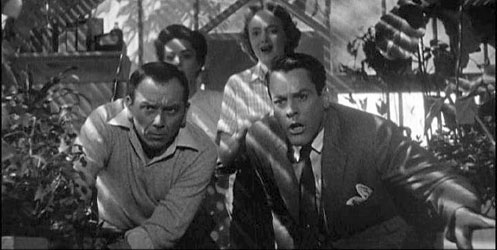Cremaster 3 by Matthew Barney
I can't really talk about this movie since I barely understood any of it. But thinking about it, and about my reactions and the reactions of the other people in the audience at a screening yesterday, has brought up a few interesting issues.
I suppose it's almost a biologically determined drive that causes us to make meaning out of the chaos of our perceptions. In some complex and tortuous way it probable helps us to reproduce. Sanity (a prerequisite for membership to any group) can be defined as a sufficient overlap in the meanings that individuals make of their surroundings. (I could be more rigorous and claim that it's only shared
action that defines groups, but that is too obvious a point to labor over here. In any case, we can't know for sure that shared thoughts produce identical actions but we will take that on faith for now. It's a far greater crime to
act crazy than think crazy.)
Imagine we find some people in front of an strange and provocative work of art devoid of all context (that is, any apparatus for determining its "meaning"). A painting perhaps, like this one:

I can imagine several reactions. Perhaps someone with an art degree will place it in a historical context, the history of abstract painting. "It looks like so-and-so's paintings." Some meaning is thereby generated, but it's clearly fraudulent in a sense, something created by the viewer through his or her personal history and knowledge. There can be no way to connect the work to the meaning that viewer creates outside that viewer's mind except through duplication of said viewer's experiences. Simply put, we can't understand the painting the way he does without his knowledge.
But suppose another viewer takes one look and proclaims the painting to be meaningless trash, and simply walks away and never considers the painting again. "Ah," might say the art degree holder, "it's simply meaningless to
you. If you knew about such-and-such it would make much more sense to you." So suppose he listens to the other man, and comes to some terms with the painting by learning about abstract art.
Fair enough, and it's probably true. But what's the point of this exercise? It's something we do on a fairly regular basis I think, and art simply makes the process explicit and hyper-conscious.
Those who like to connect everything to the political might suggest that doing these things helps us to reframe our perceptions of the world, make us self-conscious about the meanings we make. I think this is probably true as well, but it reduces the enjoyment of art to a civic duty, a petty liberal mind-opener. What a bore.
I don't mean to suggest that the above isn't a valid position, but I do want to deny it as the primary function of art.
Why can't we see our tendency to make meaning from chaos as the pointless exercise it is? Why must we make connections and causal inferences in art when it is clearly superfluous to survival? "But what's the
point of that painting?" The question offends me. Of course it's pointless. What's the point of making up points when they aren't needed?
Sitting in front of a painting like this, and watching the people gather round and hearing the cogs in their heads turn and turn, making meaning from nothing, like God on the first day of creation, would make clear to one how foolish and sad we are sometimes. How predictable. How silly.
Could we just look at it? Can it just be? Without meaning.




